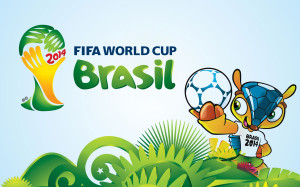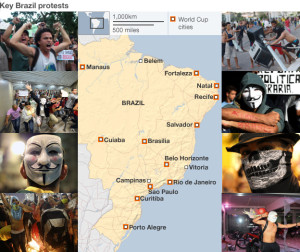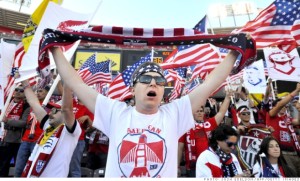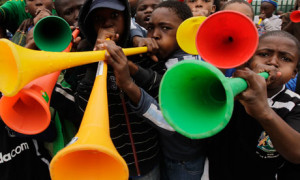 You do not have to be a fan of the “beautiful game” of soccer to be interested in the World Cup, which kicks off in Brazil today. Not least because, like the Olympics, the political, economic and cultural factors involved mean that it transcends sports.
You do not have to be a fan of the “beautiful game” of soccer to be interested in the World Cup, which kicks off in Brazil today. Not least because, like the Olympics, the political, economic and cultural factors involved mean that it transcends sports.
This is why the matches (and even who wins that coveted Cup) are relatively unimportant. What matters most is that Brazil puts on a good show. And it will; notwithstanding reports about lack of preparedness and ongoing civil strife that have given many cause for concern.
But it has become de rigueur for preparations for every Olympics or World Cup to be dogged by reports about administrative incompetence and construction delays; not to mention financial skullduggery, which inspired The Economist to emblazon the cover of its current edition with the headline, “Beautiful game, Ugly business.”
 The problem is that, in this case, such reports have resonated and habituated as never before. Most notable are those about purportedly soccer-mad Brazilians taking to the streets, even today, to protest against their country hosting the World Cup, which must strike soccer fans around the world as tantamount to Germans taking to the streets to protest against their country hosting the Oktoberfest. Yet I sympathize with the protesters:
The problem is that, in this case, such reports have resonated and habituated as never before. Most notable are those about purportedly soccer-mad Brazilians taking to the streets, even today, to protest against their country hosting the World Cup, which must strike soccer fans around the world as tantamount to Germans taking to the streets to protest against their country hosting the Oktoberfest. Yet I sympathize with the protesters:
It really is unconscionable to be raising transit fares on poor, working-class Brazilians, while gentrifying their neighborhoods to build billion-dollar stadiums and venues to host the soccer World Cup next year and the Summer Olympics in 2016.
On the other hand, even if these protesters do not appreciate the reputational damage their actions are causing Brazil, their president is painfully aware that this ongoing unrest does not inspire confidence in the international community that Brazil will be able to host the World Cup…
In fact, safety concerns surrounding the ‘warm-up’ Federation Cup could not be more dispiriting and inhibiting for foreign teams. And I fear only turning Brazil into a de facto police state will allay those concerns when it comes to the Olympics….
(“Brazil’s Arab Spring-Style Protests,” The iPINIONS Journal, June 24, 2013)
Meanwhile, airport and transit workers are threatening to strike to extract wage increases; the power grid could plunge the entire country into darkness at any moment, and universal concerns about match fixing could incite hooliganistic reaction to referee calls and final scores. These are just some of the political grievances, technical difficulties, and soccer scandals that could undermine the hospitality the Brazilian government clearly hopes to lavish on the 31 national teams and hundreds of thousands of visiting fans over the next four weeks.
Despite the World Cup’s international popularity, the event remains a divisive issue among Brazilians themselves. A recent poll found that 72 percent are dissatisfied with their country’s current state, a mindset exacerbated by the government’s decision to spend billions of dollars to host a soccer tournament rather than to address the nation’s myriad domestic problems [especially related to infrastructure, education and health].
(International Business Times, June 11, 2014)
 I’m convinced, however, that, just as it was in South Africa, jingoistic pride in Brazil will make all other issues seem utterly irrelevant once matches begin. More to the point, I’m confidant that Brazil will host a great tournament and that all fans (local and foreign) will be able to enjoy the matches in a relatively safe and festive environment, especially given that, just as I predicted, it has become, for all intents and purposes, a police state.
I’m convinced, however, that, just as it was in South Africa, jingoistic pride in Brazil will make all other issues seem utterly irrelevant once matches begin. More to the point, I’m confidant that Brazil will host a great tournament and that all fans (local and foreign) will be able to enjoy the matches in a relatively safe and festive environment, especially given that, just as I predicted, it has become, for all intents and purposes, a police state.
Except that all bets are off, and God help the government, if heavily favored Brazil fails to win this World Cup, to say nothing of the fallout if it fails to win today’s opening match against Croatia….
For the record, I am not a soccer fan. What’s more, because no Caribbean country even qualified a national team, I don’t even have a jingoistic motivation to join the “nearly half of humanity [who] will watch at least part of the World Cup” – to quote The Economist.
Nevertheless, just to make things more interesting for an old friend, who will be rooting his heart out for England, I’ve decided to bet on and root for Nigeria. (Winning the World Cup won’t cause those Boko Haram nincompoops to release the hundreds of schoolgirls they kidnapped recently, but it would provide this grieving and beleaguered country a much-needed boost of national pride.)
 Finally, given my residency here, it would be ungracious of me not to mention the United States. Not that it has a prayer of winning, mind you. After all, here’s what no less a person than U.S. Coach Jurgen Klinsmann said about this prospect:
Finally, given my residency here, it would be ungracious of me not to mention the United States. Not that it has a prayer of winning, mind you. After all, here’s what no less a person than U.S. Coach Jurgen Klinsmann said about this prospect:
[The U.S. national team] winning the World Cup, you know, is unrealistic. We shouldn’t be expected to win.
(The Associated Press, June 11, 2014)
Instead, the real story here is that Americans seem afflicted with the kind of World-Cup fever one would’ve expected to be epidemic among Brazilians. Nothing demonstrates this quite like the United States being the second-largest market for tickets, after Chile but ahead of Spain, which won the last World Cup in 2010.
 Finally, there’s this about the legacy of those South African vuvezelas:
Finally, there’s this about the legacy of those South African vuvezelas:
South Africans appear to be the only ones who have no problem with the monotonous blaring of vuvuzelas that are drowning out the cheers and jeers that normally imbue matches with their adversarial pathos.
Even worse, they make it impossible for players and coaches to communicate on the pitch, and have even caused thousands of people to suffer permanent hearing loss. In fact, the sound of these vuvuzelas has become such a disquieting nuisance for fans watching via television around the world that some broadcasters (like the BBC) have begun filtering it out.
(“South Africa on Verge of Being Kicked Out of World Cup,” The iPINIONS Journal, June 17, 2010)
That I was roundly heckled as an imperialist party-pooper for writing this will probably surprise none of you. But this might:
FIFA is coming down hard on celebratory noisemakers since they banned vuvuzelas from the 2014 Brazilian World Cup.
In addition to the horns that plagued the 2010 South African World Cup, fireworks, food, megaphones, hooters, and banners larger than 32 square feet are also prohibited.
(UPI, June 10, 2014)
That’s vindication folks!
Now let the matches begin! And may Nigeria win….
Related commentaries:
Brazil’s Arab Spring…
South Africa…